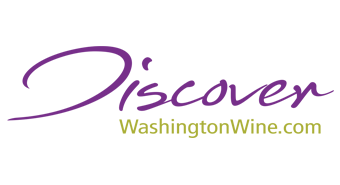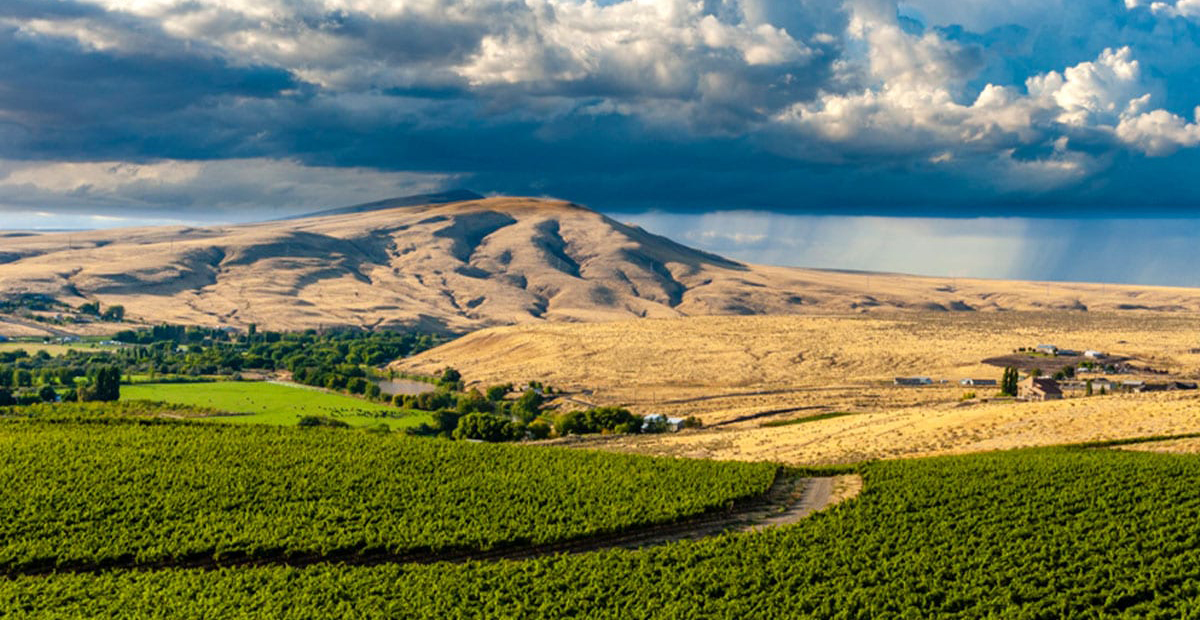Red Mountain AVA Celebrates 20th Anniversary
The impact of the AVA isn’t limited to just vineyards and wineries located on Red Mountain. It extends statewide via wineries all over the state that utilize the area’s grapes in many of the wines they produce.
EDITOR’S NOTE: The Red Mountain Revealed video shown above is a shortened version of the 21-minute original version of the video released in 2018. To view the full 21-minute video, visit: www.redmountainava.com.
By Dan Radil and Charles Leininger
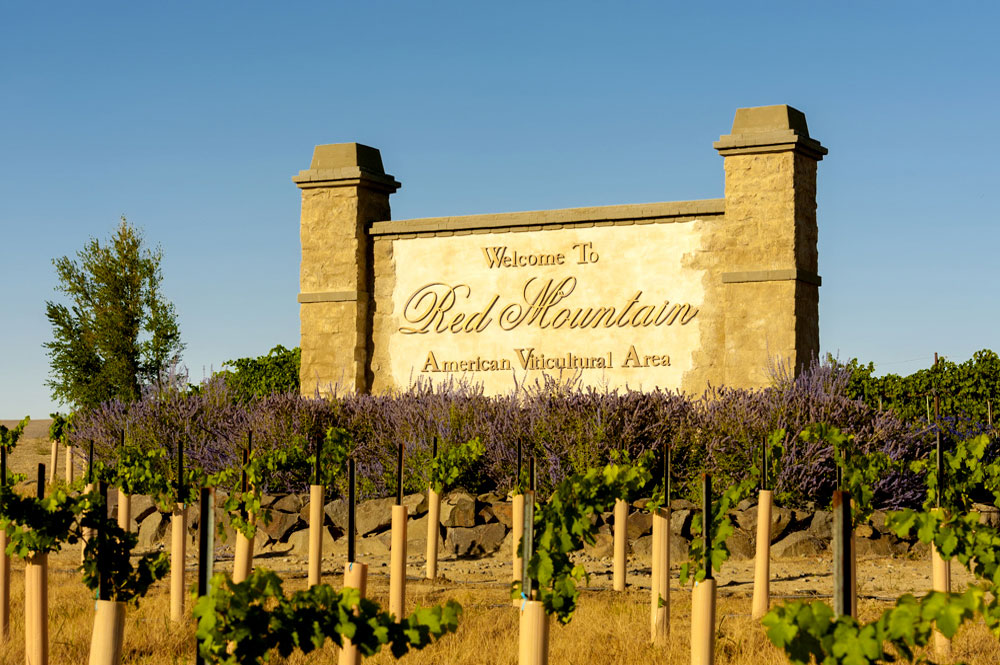
Wine enthusiasts visiting Red Mountain know they are in the right place when they see this sign on State Route 224. Photo credit: ©Richard Duval Images.
Tucked away on a hillside about 15 miles west of the Tri-Cities, the Red Mountain American Viticultural Area (AVA) is one of Washington’s most prominent wine grape growing regions.
Until neighboring Candy Mountain received official AVA status last fall, Red Mountain, at just a shade over 4,000 acres, was the smallest AVA in Washington State, but it has always been big on producing some of the best red wines in the country. Top red grape varieties grown here include cabernet sauvignon, merlot, syrah, malbec, cabernet franc, and petit verdot.
Any time is a good time to enjoy a bottle of Red Mountain wine, but 2021 is a time for celebration on the mountain — it’s the 20th Anniversary of Red Mountain being recognized as an official AVA.
In late 1998, Tom Hedges, owner of Hedges Family Estate, and Lorne Jacobsen, his national sales manager at the time, decided that it was time that Red Mountain became an officially recognized AVA. “Lorne did most of the work involved in filing our petition, with considerable help from Jim Holmes,” Hedges explains, ”but it took three years and a phone call by then Congressman Doc Hastings of Washington’s 4th District to finally get our application approved on April 21st, 2001.”
Being approved as an official AVA made every bottle of Red Mountain wine more valuable from that day forward. In fact, according to Hedges, any wine made from Red Mountain grapes from any year prior to the approval can be relabeled as Red Mountain.
The first Red Mountain wine pioneers initially walked the land in the summer of 1972. They found a gently sloping sagebrush covered hillside that had been largely overlooked by both early settlers and local indigenous peoples. There were no roads, wells, power lines or any other signs of civilization.
These wine pioneers were John Williams and Jim Holmes. They had been greatly influenced by the wine grape research conducted by Dr. Walter Clore and his staff at the WSU agricultural station in Prosser, WA.
Three years later in 1975, after obtaining power, water and rights-of-way to the property, they planted the first ten acres of vineyard on Red Mountain. The land was located near the unincorporated town of Kiona, so they named their new venture Kiona Vineyards. As wine hobbyists, they had imagined that planting a vineyard might be fun, and maybe even profitable. While they hoped that their efforts may one day produce acceptable wine, they had not envisioned the greatness that was to follow.
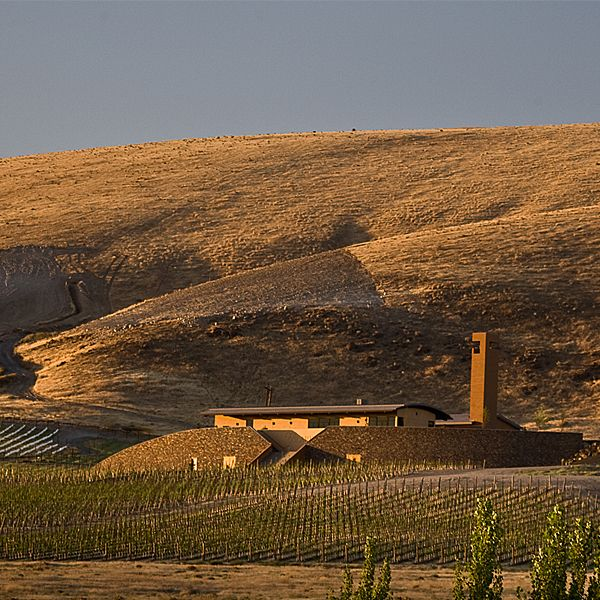
As you drive west on Sunset Road, an otherly-world image will appear on your right just below the base of Red Mountain. The image is that of Col Solare Winery, a partnership between Chateau Ste. Michelle and Tuscany’s Marchesi Antinori. It’s a “must-see” stop on any tour of Red Mountain.
The first wines produced were remarkably good, and the reputation of Red Mountain began to grow. They sold their grapes to some of the wineries that are now recognized as some of the best in the state.
Along the way, Williams and Holmes expanded their holdings by purchasing other vineyards on Red Mountain, including a vineyard called Ciel du Cheval. But in 1994, Williams and Holmes parted amicably (and remain best of friends), Williams retaining 100% of Kiona Vineyards and Holmes taking ownership of Ciel du Cheval.
Today, 14 wineries call Red Mountain home: Col Solare, Cooper Wine Company, Domaine Magdalena, Fidelitas Wines & Estate Vineyard, Frichette Winery, Hamilton Cellars, Hedges Family Estate, Hightower Cellars, Kiona Vineyards & Winery, MonteScarlatto Estate Winery and Vineyards, Red Mountain Trails Winery, Tapteil Vineyards and Winery, Terra Blanca Winery & Estate Vineyard and Upchurch Vineyard.
In addition to the 14 wineries, Red Mountain is home to approximately 54 vineyards of varying sizes covering more than 2,300 acres, making Red Mountain one of the most densely planted AVA’s with 57% of the AVA currently planted.
The agricultural success of the region lies in a number of important climatic and geographic features, including a sun-drenched southwest-facing slope, soils rich in alkaline and calcium carbonate, and a warm, almost desert-like environment tempered by cool evenings and the influence of the nearby Yakima River.
For winemakers, that’s a recipe for potentially picture-perfect wines with intense and focused fruit flavors, a streak of minerality, and seamlessly balanced acidity levels.
But the impact of the Red Mountain AVA isn’t limited to just vineyards and wineries located within the region. It extends statewide through a cooperative known as the Red Mountain AVA Alliance and includes wineries all over the state that utilize the area’s grapes in many of the wines they produce.
Tim Hightower, President of the Alliance, and his wife Kelly, moved from the Seattle area to Red Mountain in 2002 to establish their own Estate Vineyard and Winery called Hightower Cellars. They planted their first grapes in 2005.
“We fell in love with Red Mountain after tasting wines from there in the 1990’s,” recalls Tim, noting that “it was the concentration of fruit and balance of the wines that was captivating.”
“Even though it’s a warm area, it’s also windy, which thickens the skins of the grapes and results in smaller berries,” he explains. This contributes to the concentrated flavors in the finished product that are a hallmark of the region’s wines.
“The ‘neighborhood’ on Red Mountain is also fantastic,” adds Kelly. “The quality of the people it’s attracted has really resulted in quality wines.”
“And the personality of the winemakers comes through in the personality of the wines,” notes Tim, referring again to the quality product that wine consumers will find here.
Among Hightower’s best-selling wines are its 2016 Red Mountain Estate Blend, 2017 Merlot and 2018 Murray Cabernet Sauvignon. A blend of 50% Cabernet Franc, 25% Merlot, and 25% Malbec, the Estate Blend will run you $45 per bottle. At a price point of $30, the Merlot is blended with just a touch of Cabernet Franc and Petit Verdot. The 2018 Murray Cabernet Sauvignon was one of only 18 Double Gold medalist at the 2020 Bellingham Northwest Wine Festival’s judged competition. It sells for just $25 per bottle.

Visitors to Hedges Family Estate think they’ve landed in France when they encounter the Chateau-style architecture of the building that houses the winery’s tasting room .
With more than 30 years of vintages behind them, Tom and Marie Hedges, owners of Hedges Family Estate, can proudly look back at their pioneering efforts to help establish the modern Washington wine industry, and specifically to their efforts in establishing the renowned Red Mountain American Viticultural Area.
Tom and Anne Marie purchased their first 50 acres on Red Mountain in 1989 and now have 110 acres under vine. They have carefully crafted their old-world style wines and their French inspired Estate. Both will transport you to another world. The concepts of “estate grown, family operated, and biodynamically and organically certified vineyards and winery” lay the foundation for Hedges Family Estate.
In addition to its world-renowned Cabernet, Merlot and Syrah based wines, Hedges “colors outside the lines” by producing a pair of biodynamically certified Portuguese varietal wines. Its 2018 Single Vineyard Limited Souzão-Tinta Cão and 2018 Single Vineyard Limited Touriga Nacional are both bold, full-bodied wines that age exceptionally well. Both wines sell for $60 a bottle.
Neighboring winery Fidelitas sits on 12 acres of Estate vineyard but buys additional grapes from 8 to 10 Red Mountain partners. Fidelitas is a family-owned, family-run winery founded by veteran winemaker Charlie Hoppes. However, these days, Charlie’s son Will has taken over the duties as the winery’s head winemaker.
“All of the grapes we source to produce our wines come from our Estate Vineyard, or from other vineyards on Red Mountain,” Will explains. “We focus on single vineyard, single varietal bottlings and classic Bordeaux-style blends.”
Fidelitas is one of four Red Mountain wineries that has a satellite tasting room in other parts of the state. Its satellite tasting room is located on Woodinville-Redmond Road in the Hollywood District of Woodinville Wine Country. The most popular wine sold in both its Red Mountain and Woodinville tasting rooms is its 2018 Malbec, which sells for $45 per bottle.
However, the winery’s best overall seller is its Optu Red Mountain. “There is no recipe for Optu, but it’s always Cabernet Sauvignon dominant,“ says Will. “My dad shoots for 75% Cabernet, then adds Merlot for depth and length, Petit Verdot for concentration and structure, and Cabernet Franc for finesse and softening.” Prices of Fidelitas wines range from $45 per bottle on the low end to $80 on the high end. The price of a bottle of 2018 Optu Red Mountain, which earned a 95 rating from Washington wine critic Owen Bargreen is $60.
The other Red Mountain wineries that have satellite tasting rooms in other parts of the state are Terra Blanca Winery and Estate Vineyard, Col Solare and MonteScarlatto. Terra Blanca’s satellite tasting room is located on the first floor of the historic Chronical Building in Spokane and features the winery’s full selection of Red-Mountain Estate wines.
Wine enthusiasts who visit Terra Blanca’s flagship Red Mountain winery marvel at the fantastic views that radiate from the terrace of its Tuscan-style tasting room. And they can enjoy a tasty meal at the winery’s Vineyard Grill, or take an Estate Tour, which follows the grapes through the production cycle to see what happens from vine to bottle. The tour takes visitors on a journey underground beneath the tasting room and includes a private wine tasting with one of Terra Blanca’s Wine Educators.
If you haven’t seen Col Solare Winery in person, you’re in for a treat when you finally see the majestic building that houses the winery. Col Solare is a partnership between two influential wine producers who are recognized leaders in their respective regions: Tuscany’s Marchesi Antinori and Washington State’s Chateau Ste. Michelle.
With the opening of the winery and planting of the estate vineyard in 2007, Col Solare’s mission has been to unite the two unique viticultural and winemaking cultures of Italy and Washington State to produce world-class Cabernet Sauvignon from the very best Washington fruit.
If you can’t make it to Red Mountain, you can enjoy a flight of four distinct Col Solare wines at the Col Solare Bodega inside the tasting room at Chateau Ste. Michelle in Woodinville, WA.
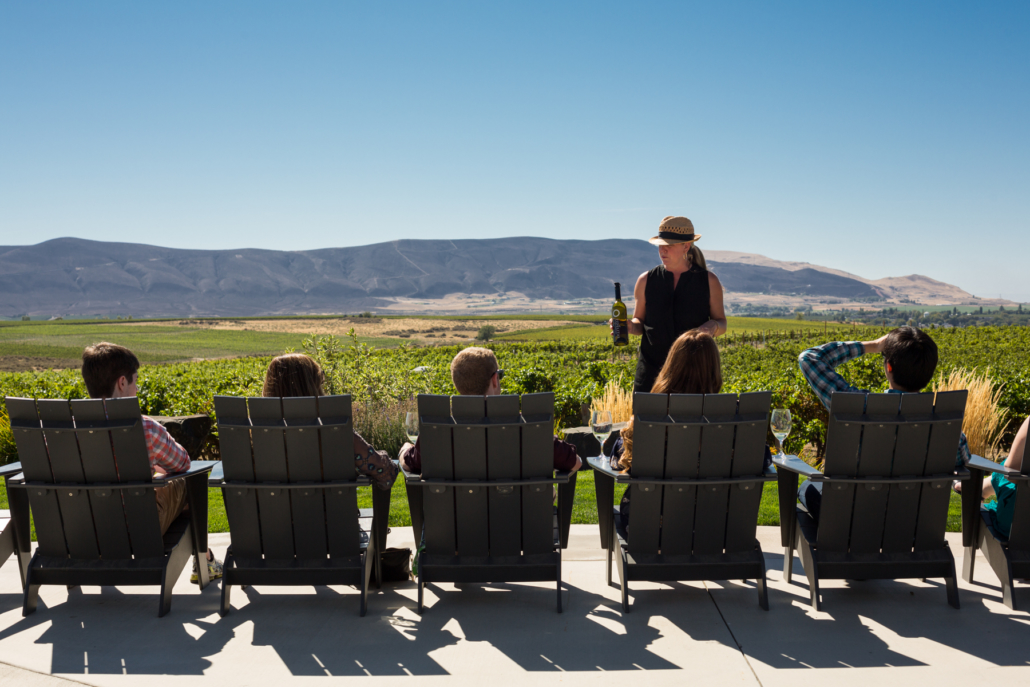
The view from the outside patio is one of the reasons guests like visiting Fidelitas Winery. The other is the personal service they get from the tasting room staff.
Even though Joel Mackay, owner of MonteScarlatto Estate Winery, bought the land on which his Estate vineyard stands today in 1994, he didn’t plant his first grapes on the land until 2007. “It took that long because of the tremendous amount of work it took to transform the sagebrush covered land into a working vineyard,” Mackay explains . He not only planted a vineyard on the land, but he built a 9-hole, par 3 golf course on it too so visitors can play a round of golf and enjoy a glass of wine on the property’s 10th hole tasting room afterwards.
But he didn’t stop there. In 2017, he opened a tasting room in Spokane called The Renegade Room Wine Bar. Located across the street from Spokane’s historic Davenport Hotel, the tasting room serves all of the wines that Mackey serves at his Red Mountain tasting room via glass pours, bottle purchases and yes, even wine on tap. The Spokane tasting room also serves craft beer and a selection of food items just as tasteful as its wines.
Mackay prides himself in not only making big red wines like Cabernet Sauvignon, and Merlot, but making wines like Carménère, Barbera, Malbec and Cab Franc – wines that many wineries don’t offer.
The newest kids on the Red Mountain block are Greg and Shae Frichette. They opened Frichette Winery on Sunset Road in 2013 offering their first vintage of 2011 wine. That year, they made 650 cases of wine. Today they are a 2,000-case winery hosting events for wine club members and guests from all over the world.
Both Greg and Shae are winemakers, Greg making the winery’s flagship Frichette brand, Shae making a wine in her own image called Sashay. To introduce wine enthusiasts to their Frichette brand, they offer a 3-bottle introductory pack of wine consisting of a bottle of 2018 Merlot, a bottle of 2018 Malbec and a bottle of 2018 Red Mountain Reserve. The 2018 Reserve is a blend of five different varieties that creates distinct layers of flavor and complexity. The 3-bottle starter pack sells for $139.
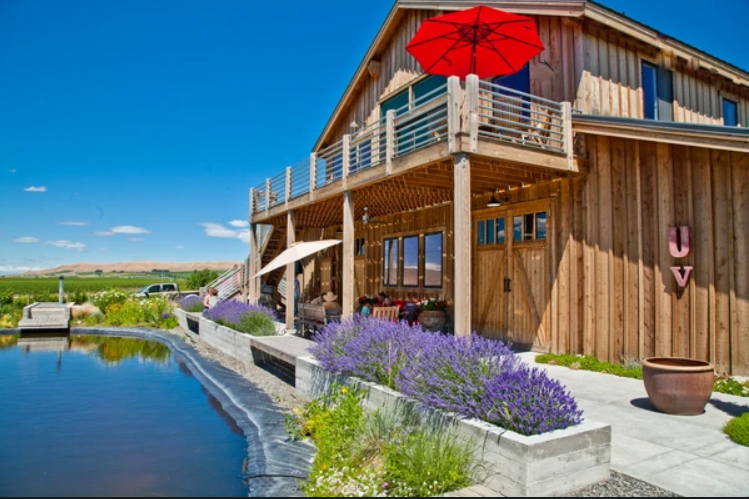
This year, Upchurch Vineyard celebrates the 5th Anniversary of the grand opening of “The Barn,” the vineyard’s tasting room and production facility on Red Mountain. The tasting room is open by appointment only this spring Friday through Sunday, 11 a.m. to 5 p.m.
After attending a Celebration of Black Women in Wine event, hosted by Urban Connoisseurs, Shae was inspired to create her own label focusing on softer, even more approachable wines made with grapes sourced from Red Mountain and Columbia Valley AVAs. She calls this label Sashay. Named after a word she loved hearing the ladies in her family use and also a play on her name, Sashay has taken its place in the Frichette portfolio beautifully well. So far, Shae has made two Sashay wines, a Rosé and a Syrah. If the wine industry gave medals for label design, these wines would surely win Double Gold honors. Check them out at: www.frichettewinery.com.
What would an article about Red Mountain be without mentioning Chris Upchurch and Upchurch Vineyard. After serving 23 years as founding winemaker and partner at Woodinville-based DeLille Cellars, Chris struck out on his own and developed his own vineyard on Red Mountain. Today, Chris and his wife Thea are celebrating the 5th Anniversary of the opening of their tasting room and production facility, and they will be releasing their 10th vintage of Upchurch wines this fall. Called “The Barn,” the Upchurches’ tasting room and production facility made its debut in May, 2016.
The stars of this year’s offerings at Upchurch include the winery’s 2018 Upchurch Vineyard Cabernet Sauvignon (a blend of 91% Cab and 9% Merlot), 2018 Counterpart (65% Merlot and 35% Cabernet Sauvignon), 2018 Southwest Facing Sauvignon Blanc (100% Sauvignon Blanc from Boushey Vineyard), and two varieties of the winery’s newest label, 2018 LTL Cabernet Sauvignon and 2019 LTL Rose. All are very limited production wines.
Vineyards of Red Mountain Making
an Impact Throughout the State
Shaw Vineyards
Dick and Wendy Shaw of Shaw Vineyards own more than 3,000 acres under vine in Washington State, including 625 acres across nine vineyard sites in the Red Mountain AVA. Those 625 acres make Shaw Vineyards the largest grower of wine grapes in the AVA.
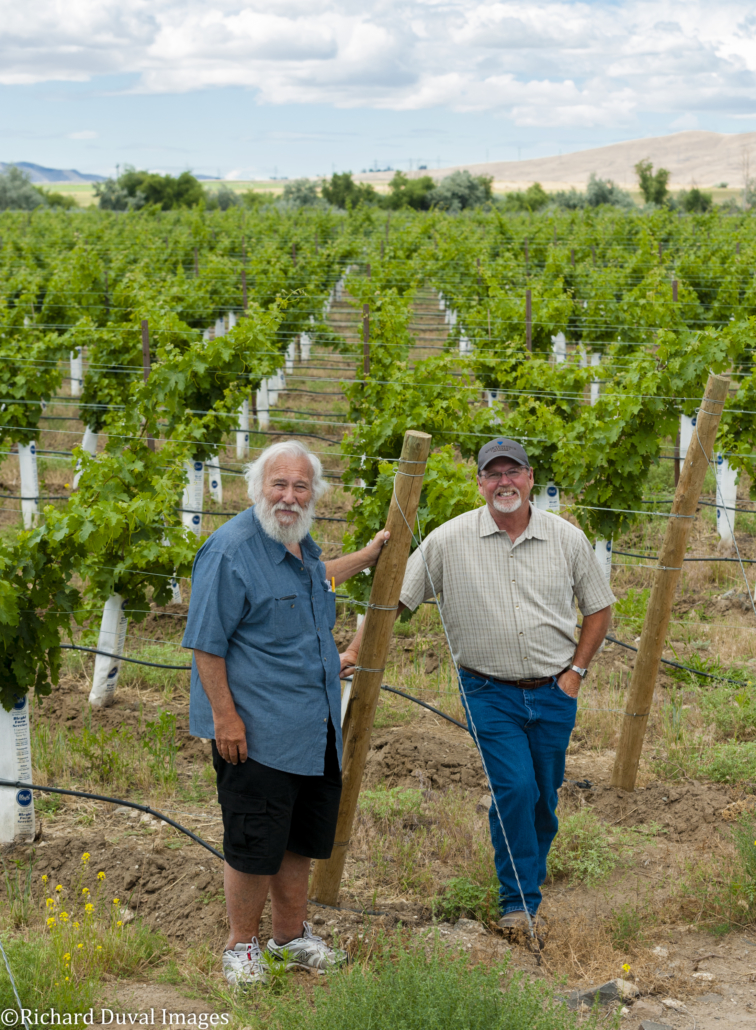
Dick Shaw (left), owner of Shaw Vineyards, has put his trust in Vineyard Manager Marshall Edwards to grow an exceptional crop of grapes every year for the past 15 years.
The Shaw’s investment on Red Mountain is comprised of nine vineyards of varying sizes, including the world-renowned Quintessence Vineyard, which is the largest of their Red Mountain holdings at 323 acres. In addition to Quintessence, the Shaw’s Red Mountain portfolio includes Shaw 32 Vineyard (96 acres), Obelisco Vineyard (27 acres), Scooteney Flats Vineyard (33 acres), Red Heaven Vineyard (47 acres), Henry Earl Estate Vineyard (15 acres), Stanton Vineyard (45 acres), North Star Vineyard (13 acres) and Quinn Ranch Vineyard (18 acres).
Marshall Edwards, who has been the Vineyard Manager for Shaw’s Red Mountain grape growing operations for 15 years, says there is a reason why the vineyards he manages produce such a sought-after commodity. “It all starts with the land and the geography,” explains Edwards. “The south facing exposure the grapes get every day produces long hot days. The hot days are followed by cool nights, and the combination of the hot and cold extremes create ideal conditions to produce smaller berries with high tannins.”
Over the years, more than 100 wineries have sourced grapes from Shaw’s Red Mountain vineyards. Most recently, those wineries have included Barnard Griffin Winery, Barrage Cellars, Callan Cellars, Canvasback, Col Solare, Columbia Winery, Duck Horn, Grossgrain Winery, Januik Winery, DeLille Cellars, Double Canyon Winery, Long Cellars, J.M. Cellars, Liberty Lake Wine Cellars, Martin Scott Winery, Milbrandt Vineyards, Frichette Winery, Fidelitas, Mark Ryan Winery, Market Vineyards, Ryan Patrick Wines, Patterson Cellars, Succession Winery, Tamarack Cellars, Truth Teller Winery, Walla Walla Vintners, and of course, Henry Earl Estates Winery.
Shaw Vineyards has received high praise from winemakers throughout the state of Washington, including Brian Rudin, head winemaker at Canvasback Winery in Walla Walla. “Shaw Vineyards has been one of our most trusted vineyard partners since we started Canvasback in 2012,” says Rudin. “They have incredible vineyard sites in their portfolio, and they farm them to the highest level of quality. With precision, care, and spot-on timing, they put a lot of pride in raising a perfect crop of grapes for their winery partners.”
Not content to simply own 3,000 acres of vineyard land in Washington State, Dick and Wendy decided they would also like to own their own winery. So, in 2013 they bought the Kennedy Building at 25 E. Main Street in Walla Walla and opened a winery they named after their fathers – Henry Shaw (Dick’s dad) and Earl West (Wendy’s dad). The name of their winery became Henry Earl Estates. Not surprisingly, all of the wines they serve at the Walla Walla tasting room are made with grapes from their Henry Earl Estate vineyard on Red Mountain.
Kiona Vineyards
Starting with the first 10 acres of grapes planted by John Williams in 1995, three generations of the Williams family have proudly farmed Kiona Vineyards and have made it one of the top producers of wine grapes in Washington State.
In addition to making its own wine for its Kiona Vineyard label, the Williams family sells grapes to dozens of wineries throughout the state, including: Avennia Winery, Betz Family Winery, Col Solare, Fidelitas, Gorman Winery, Long Shadows, Maryhill Winery, Revelry Vintners, Syncline Winery, Barrister Winery, Chateau Ste. Michelle, Barnard Griffin Winery, Futurity Cellars, Frichette Winery, Nota Bene Cellars, Sparkman Cellars, Three Rivers Winery and Walla Walla Vintners.
The Williams family grows 12 varieties of grapes on five vineyard sites encompassing 61.6 acres. The five sites are known as Kiona Estate, Heart of the Hill, Ranch at the End of the Road, Sunset Bench and Artz Vineyard. So it’s no surprise that Kiona makes wine for its own label from grapes grown at these sites. Its 93-point Estate Red Mountain Reserve is a case in point. It is a blend of 53% Cabernet Sauvignon, 28% Merlot, 11% Petit Verdot, 3% Carmenère, 3% Cabernet Franc and 2% Malbec, all grapes sourced from the vineyard’s Heart of the Hill and Kiona Estate sites. According to Kiona Vineyards’ promotional materials, the Estate Red Mountain Reserve is the answer to the question: “What’s so special about Red Mountain?”
One interesting fact about Kiona Vineyards is that it produced the first commercial bottling of Lemberger in the United States in l980. Since then, the original 1.8 acre planting of Lemberger grapes has grown to 13.1 acres. Lemberger is typically grown in cooler regions. But since Red Mountain is a blast furnace compared to other, cooler AVAs in the state, Kiona’s Lemberger results in a riper, rounder profile not found in cooler areas.
Ciel du Cheval Vineyard
When John Williams and Jim Holmes dissolved their partnership in 1994, Williams retained 100% of Kiona Vineyards and Holmes took 100% ownership in Ciel du Cheval Vineyard. Ciel du Cheval was 80 acres at the time, but Williams subsequently bought an additional 80 acres, using 40 of the 80 acres to expand Ciel du Cheval Vineyard. The other 40 acres became vineyard partnerships with the owners of two of Washington’s oldest and most prestigious wineries – Quilceda Creek Vintners of Snohomish, WA, and DeLille Cellars of Woodinville, WA.
Ciel du Cheval sells grapes to approximately two dozen of Washington State’s top wineries, including Mark Ryan, Seven Hills, Tamarack, Andrew Will, Canvasback, Januik, Double Canyon, DeLille Cellars, Soos Creek and Gibbons Lane.
In 2012, Jim’s son Richard came up with the idea of starting a winery where patrons could taste, and buy, the vineyard’s wine. Instead of opening a tasting room on Red Mountain, however, Richard opened it in Walla Walla and called it Côtes de Ciel. Located on Second Avenue in downtown Walla Walla, the tasting room features flights of Ciel du Cheval’s Estate grown wines and farm-to-table cuisine.
The wines on the tasting menu at the Walla Walla tasting room include Ciel du Cheval’s 2012 Flagship Reserve, a blend of Merlot, Cabernet Franc and Cabernet Sauvignon, as well as a 2012 Reserve Syrah, 2013 Nebbiolo and a 2014 Merlot.
Hedges Estate Vineyard
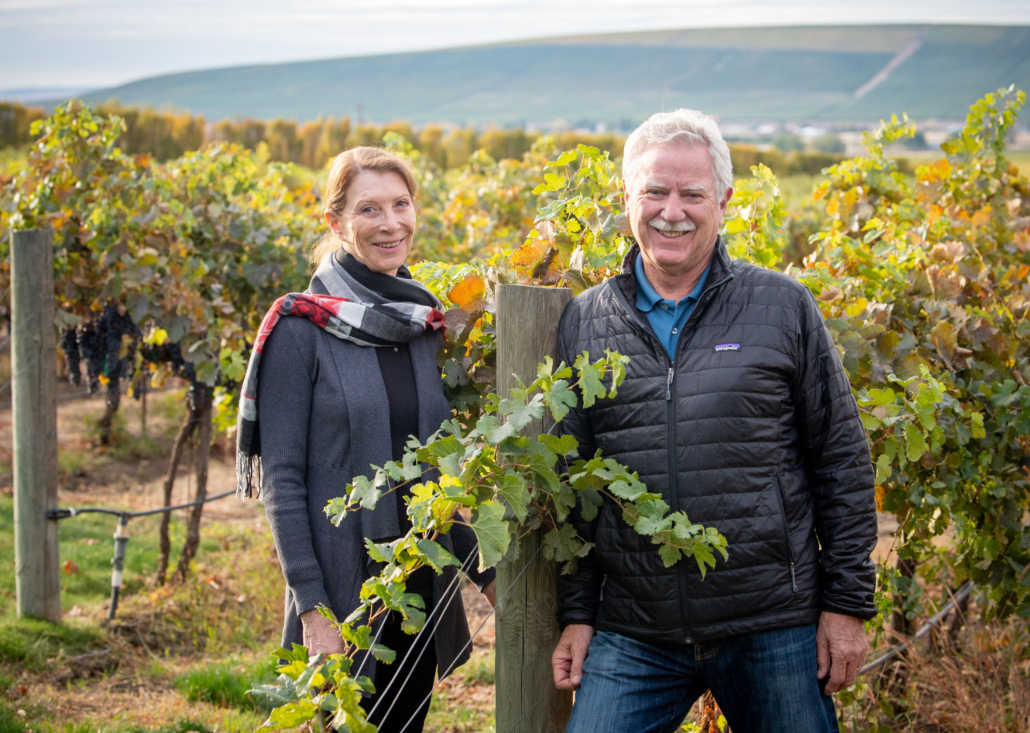
With more than 30 years of vintages behind them, Tom and Anne-Marie Hedges can proudly look back at their pioneering efforts to help establish the modern Washington wine industry.
Hedges Estate Vineyard is comprised of five vineyard sites, which are the only certified Organic and Biodynamic vineyards on Red Mountain. Hedges Estate Vineyard was certified Biodynamic in 2011 and all five of the Estate vineyards will be certified in 2021.
Hedges also produces some of the only certified biodynamic wines in Washington State. The first was the 2012 La Haute Cuvée made by Pete Hedges. Sarah Goedhart continues to create biodynamic wines since taking over the head winemaker position in 2015. Annually, the winery produces approximately 10,000 cases from its Estate vines and 50,000 cases of its CMS brand, which includes both Columbia Valley grapes and Estate grown fruit.
Hedges wines have a broad distribution all over the United States and in approximately 15 foreign countries. They were one of the first wineries in Washington to blend Cabernet Sauvignon and Merlot together, and they continue to blend their flagship Hedges Estate Red wine, which can be found far and wide for an average retail price of $30.
DeLille Cellars’ Grand Ciel Estate Vineyard
Since its founding in 1992, Woodinville’s DeLille Cellars has looked to Red Mountain as a significant source for its fruit, and in 2010 planted its own vineyard on Red Mountain in partnership with Ciel du Cheval Vineyard called Grand Ciel Estate Vineyard. This site is a “state-of-the-art,” no expense spared vineyard that produces great vintages with a focus on concentration and hang-time complexity. This is where DeLille grows all of its Cabernet Sauvignon and Syrah grapes.
That same year, DeLille created a limited production wine called Four Flags that has been one of the winery’s top sellers ever since. Four Flags is a blend of Cabernet Sauvignon from four vineyards on Red Mountain – Grand Ciel, Ciel du Cheval, Klipsun and Upchurch. This is a wine to write home about.
DeLille sources grapes from a variety of Red Mountain vineyard sites, not only for its blends, but also for small lot, barrel-selected single varietal wines. From Ciel du Cheval Vineyard, DeLille sources grapes for its Cabernet Sauvignon, Merlot, Cabernet Franc, Grenache, Petite Verdot, Roussanne, Syrah and Viognier wines. From Klipsun Vineyard, they source gapes for their 100% Klipsun Vineyard Cabernet Sauvignon, Chaleur State, Four Flags and Chaleur Blanc wines.
DeLille also sources grapes from Shaw Vineyard sites on Red Mountain, including the renowned Quintessence Vineyard.
“Red Mountain’s unique position within the Columbia Valley offers one of the state’s best areas to grow wine grapes, especially Cabernet Sauvignon,” states Jason Gorski, Director of Winemaking and Viticulture for DeLille Cellars. “The elevation gain of the hillside itself, combined with the air flow generated by the Yakima River which surrounds the entire southwest facing slope, contributes to an amazing combination of additional sunlight and cool breezes.”
Gorski adds, “One of the warmest AVA’s in the state, Red Mountain is home to some of the best vineyards in the State of Washington. Those vineyards grow dense, tannic wines that reward careful winemaking with powerful, yet balanced wines that can age for decades.”
Ambassador Wines
Ambassador Wines of Washington produces 100% estate grown Washington state red wines from its Estate vineyard located in the heart of Red Mountain. Since its founding in 2004, the owners of Woodinville-based Ambassador Wines have been committed to making wines of the finest quality that reflect the richness and diversity of the Red Mountain terroir.
The stars of the Ambassador wines are its 2017 Syrah, which is blended with 12% Malbec, its 2017 Minister, its 2017 Envoy and its 2017 Plenipotentiary Cabernet Sauvignon. The 2017 Minister is a Bordeaux-blend comprised of 70% Merlot, 15% Cabernet Sauvignon, 8% Malbec, and 7% Petit Verdot and it will benefit even more with another three to five years of cellaring.
The 2017 Envoy is another excellent Bordeaux blend that includes 53% Merlot, 26% Cabernet Sauvignon, 16% Cabernet Franc, 3% Malbec, and 2% Petit Verdot and the 2017 Plenipotentiary Cabernet Sauvignon is, in a word…delicious! Although it’s entirely approachable now, one can hardly wait to see what this wine has in store with a few more years of aging.
Ambassador Wines has a tasting room in Woodinville, WA., where you can taste, and buy, all of their wines. It’s located at 19501 144th Ave. N.E., Suite C-400. Phone: (425) 949-8322. Tasting room hours are Friday, 1 p.m. to 5 p.m. and Saturday and Sunday, noon to 5 p.m.
**********
As we indicated at the beginning of this article, there are a total of 54 vineyards of varying shapes and sizes on Red Mountain. Unfortunately, we don’t have the space in this article to name all of them, so we are happy to refer you to the Red Mountain Wine Alliance, where you can find a more complete list of Red Mountain partners. The Alliance’s website is: www.redmountainava.com.
Visiting Red Mountain
For those considering a visit to Red Mountain, there are plenty of lodging accommodations in the nearby town of Prosser to the west an in the Tri-Cities towns of Richland, Kennewick and Pasco to the east, including The Lodge at Columbia Point, a highly recommended riverside hotel in Richland. For a comprehensive list of places to stay in the Tri-Cities log onto: www.visittri-cities.com and click on “Hotels & Lodging.”
But if you can’t visit the wineries on Red Mountain in person this year, there are many ways you can enjoy wine made from Red Mountain grapes. You can find Red Mountain wines at dozens of grocery stores and wine retailers throughout the State of Washington, you can buy wine online from the websites of just about every winery in the state that produces Red Mountain wines and you are likely to find wineries close to where you live that make wines from Red Mountain grapes.
If you have never tasted wine made from Red Mountain grapes, this is the year to make it happen.
EDITOR’S NOTE: Dan Radil is a freelance wine writer and educator based in Bellingham, WA., and has been an avid follower and supporter of the Washington wine industry since the mid-1980s. He currently contributes to Wine Press Northwest and Bellingham Alive Magazine, is President of the Whatcom Beer & Wine Foundation, and produces a wine blog called: danthewineguy.com. Charles Leininger is the Publisher of DiscoverWashingtonWine.com.
